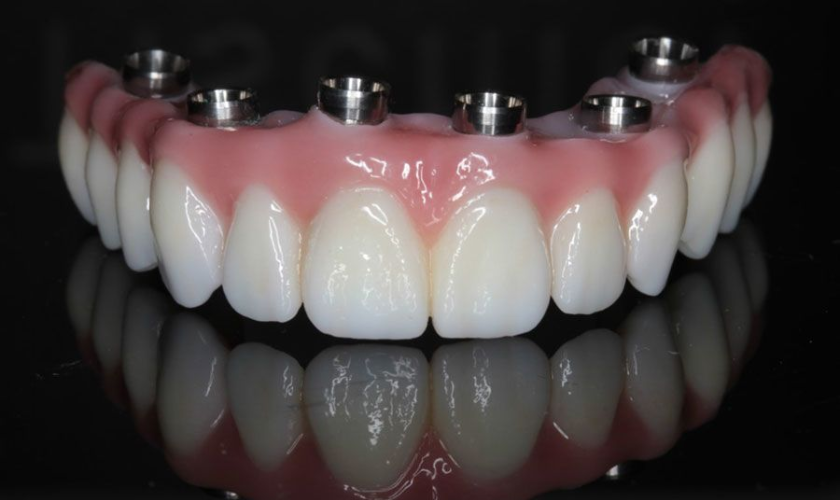
Full mouth restoration, also known as full mouth reconstruction or rehabilitation, is a comprehensive dental treatment that involves restoring and/or replacing most or all of the teeth in the upper and lower jaws. This intricate process aims to enhance the functionality, health, and aesthetics of a patient’s mouth. It’s a term that encompasses a range of procedures tailored to address various dental issues, from severe tooth decay and gum disease to trauma and congenital defects.
The Importance of Full Mouth Restoration
Full mouth restoration is more than a cosmetic makeover. While the aesthetic benefits are significant, the primary focus is on improving oral health and function. Here are some key reasons why someone might need full mouth restoration:
- Severe Tooth Decay and Damage: Extensive decay can compromise the structural integrity of multiple teeth. Full mouth restoration addresses these issues comprehensively.
- Gum Disease: Advanced periodontal disease can lead to tooth loss and damage to the supporting bone structure, requiring extensive treatment.
- Trauma or Injury: Accidents that result in broken, cracked, or missing teeth often necessitate a full mouth reconstruction.
- Congenital Conditions: Some individuals are born with dental issues that affect the entire mouth, requiring extensive restorative work.
- Worn Teeth: Conditions like bruxism (teeth grinding) can wear down teeth over time, necessitating restorative procedures.
The Comprehensive Nature of Full Mouth Restoration
Full mouth restoration is not a one-size-fits-all solution. It involves a series of procedures customized to meet the specific needs of the patient. Here’s a closer look at some common treatments involved:
- Dental Crowns: These are caps placed over damaged or decayed teeth to restore their shape, size, and function.
- Bridges: Dental bridges fill the gap created by one or more missing teeth. They are anchored by crowns on adjacent teeth or implants.
- Dental Implants: Implants are titanium posts surgically placed in the jawbone to replace missing tooth roots. They provide a strong foundation for artificial teeth.
- Veneers: Thin shells of porcelain or composite resin that cover the front surface of teeth to improve their appearance.
- Inlays and Onlays: These are indirect fillings made of porcelain or composite materials that fit into or onto the tooth to restore its function and aesthetics.
- Orthodontics: Braces or clear aligners may be used to correct misaligned teeth and bite issues.
- Periodontal Treatments: Procedures to treat gum disease and restore the health of the gums and supporting bone structures.
- Root Canal Therapy: Treatment to remove infected or damaged pulp from the inside of a tooth, preserving the tooth structure.
The Process of Full Mouth Restoration
The journey of full mouth restoration begins with a comprehensive evaluation by a dentist or a team of dental specialists. This evaluation typically includes:
- Dental Examination: A thorough examination of the teeth, gums, and overall oral health.
- X-rays and Imaging: Radiographic images to assess the condition of the teeth, roots, and jawbone.
- Diagnostic Models: Impressions of the teeth to create models for planning the restoration.
- Assessment of Occlusion: Analysis of the bite and how the teeth come together.
- Consultation: Discussion of the patient’s goals, concerns, and treatment options.
Once the evaluation is complete, a detailed treatment plan is developed. This plan outlines the necessary procedures, the sequence in which they will be performed, and the estimated timeline and costs.
Benefits of Full Mouth Restoration
The benefits of full mouth restoration are multifaceted, impacting both the functional and aesthetic aspects of oral health. Some of the key benefits include:
- Improved Oral Health: Addressing decay, gum disease, and other issues restores the overall health of the mouth.
- Enhanced Functionality: Restoring damaged or missing teeth improves chewing, speaking, and overall comfort.
- Aesthetic Enhancement: Procedures like veneers and crowns improve the appearance of the teeth, leading to a more confident smile.
- Long-Term Durability: Many restorative procedures offer long-lasting results, reducing the need for future dental work.
- Boosted Self-Confidence: A healthy, functional, and attractive smile can significantly enhance self-esteem and quality of life.
Choosing the Right Dental Professional
Given the complexity and scope of full mouth restoration, it is crucial to choose the right dental professional. Here are some tips for selecting a qualified dentist or team:
- Experience and Expertise: Look for dentists with extensive experience in restorative dentistry and a proven track record of successful full mouth restorations.
- Specializations: Depending on your needs, you may require specialists such as periodontists, prosthodontists, or orthodontists.
- Patient Reviews and Testimonials: Reading reviews and testimonials from previous patients can provide insight into the quality of care and patient satisfaction.
- Technology and Techniques: Ensure the dental practice uses advanced technology and up-to-date techniques for accurate diagnosis and effective treatment.
- Consultation and Communication: Choose a dentist who takes the time to understand your concerns, explain treatment options, and communicate clearly throughout the process.
The Cost of Full Mouth Restoration
The cost of full mouth restoration can vary widely based on several factors, including the extent of the work required, the materials used, and the geographical location of the dental practice. It’s essential to discuss the cost and payment options with your dentist. Some dental practices offer financing plans or work with dental insurance to help manage the cost.
Full mouth restoration is a transformative approach to addressing extensive dental issues, restoring both function and aesthetics to the mouth. It involves a combination of procedures tailored to meet the unique needs of each patient, ensuring a healthy, functional, and attractive smile. Whether due to decay, injury, congenital conditions, or wear and tear, full mouth restoration offers a comprehensive solution that can significantly enhance quality of life.
Choosing the right dental professional, understanding the process, and considering the benefits and costs are crucial steps in embarking on this journey. With the right care and expertise, full mouth restoration can provide lasting results and a renewed sense of confidence and well-being.


